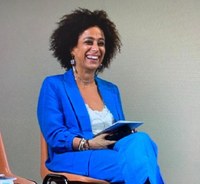Literary forgeries, Traveling Texts and Fake Literature (?) The case of the Pseudo-Boccaccio’s Calonaco da Siena and Urbano.
Forgery and imitation: why have many works been wrongly attributed to Giovanni Boccaccio after his death?
-
Date: 28 JUNE 2022 from 17:30 to 19:00
-
Event location: Online event
-
Type: Lectures
Abstract
Galeotto fu il libro e chi lo scrisse, this verse from Dante’s Inferno V, lends itself to introduce the two protagonists of Roberta Morosini’s lecture: the Book (il Libro) and its Author (Chi lo scrisse). Who wrote that book? Boccaccio commentator to Inferno V wrongly thinks that Galheut himself wrote it, falling inadvertently in the same trap history will reserve to him as an author. Given the topic of “falso/ forgeries” proposed by the UNIBO Institute of Advanced Studies 2020-2021 the talk addresses the instability of the physical text (J. McGann’s “textual condition”, P. Zumthor “mouvance) to approach two works attributed to Boccaccio: Calonaco da Siena (late 1300) and L’Urbano (1482). The fortune of the latter in France, translated by Claudine Scève as Urbein Le Mescogneu histoire by Jean Boccace allows to tackle on imitations, literary forgeries, adaptations, and translations within the “migration of texts” (A. Pettegree), the movement of vernacular literature in 15th and sixteenth century, looking at books as material objects and the vehicles of historiographical practice. The aim is to explore further the fascinating world of imitation and literary forgeries and if they should be considered for their literariness rather than for their doubtful authorship.

Speaker
ISA Visiting Fellow
Prof. Roberta Morosini
Full Professor - Wake Forest University
Visit Prof. Morosini's web page
She received her Ph.D in Italian Medieval Literature from McGill University. She is Full Professor of Italian at Wake Forest University and the 2019-2020 Charles Speroni Endowed Chair in Italian at UCLA. She is on the Advisory board of The Mediterranean Seminar and the Ente Nazionale Giovanni Boccaccio. She has been twice vice president of the American Boccaccio Association; Fellow of the “Villa I Tatti”, the Harvard Center of Renaissance Studies in Florence and the “Liguria Study Center” in Bogliasco. She is also a 2012 Fellow scholar for the NEH Mediterranean Summer Institute, the recipient of the Città di Sarno Luigi De Lise Culture Award (2015) .
Her research is centered around Medieval and Early Modern Italy in and of the Mediterranean and mainly inquires on storytelling, reception and modalities of narration with a constant attention to the relation between text and image and the representation of spaces where stories and legends unfold. She is interested in literary geography and cartography from Dante to the Renaissance Island books and in the effort to articulate a poetics of the Mediterranean, she recently published the book Il mare salato. Il Mediterraneo di Dante, Petrarca e Boccaccio (Viella 2020), that is a geocritical study of the sea through texts and images.
She has written numerous articles on mobility and crossings in the Medieval Mediterranean (What a Difference a Sea Makes in the Decameron, 2019; “The widest expanse of water”. Space and Itineraries of Mediterranean Dante. With a note on the voyages of Medusa and Ysiphile, 2019) and co-edited a volume on the Franciscan historian and geographer Paolino Veneto. Storico, Narratore e Geografo, 2019. Morosini’s pan-mediterranean research interests include also the study of Christian-Muslim Relations (Brill 2010). Morosini’s recent publications are Rotte di poesia, Rotte di civiltà. Il Mediterraneo degli dei nella Genealogia di Boccaccio e Piero di Cosimo (Castelvecchi 2021); Dante, san Macario e i calzari di Gesù -Francesco nel ciclo pittorico di Bosa. Studio dell’Incontro dei tre vivi e dei tre morti (Mediando 2021); Dante, il Profeta e il Libro. La leggenda del toro e del libro sacro dalla Commedia a Filippino Lippi tra sussurri di colomba ed echi di Bisanzio , 2018.
to attend the lecture
This lecture will be held exclusively online via Zoom.
PhD students and researchers who are interested may request an attendance certificate.